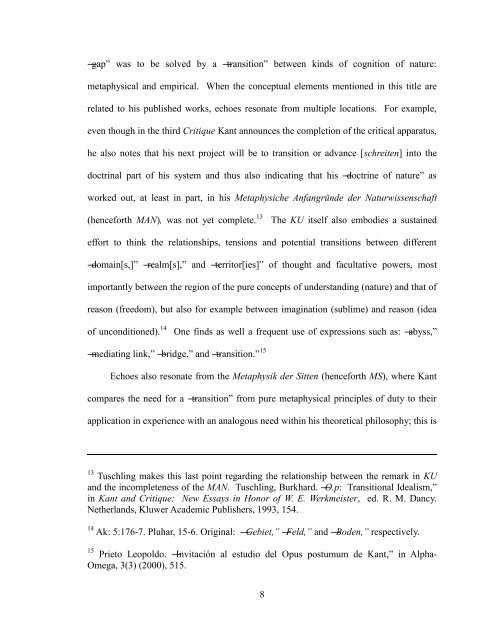The Doctrine of Self-positing and Receptivity in Kant's Late ...
The Doctrine of Self-positing and Receptivity in Kant's Late ...
The Doctrine of Self-positing and Receptivity in Kant's Late ...
Create successful ePaper yourself
Turn your PDF publications into a flip-book with our unique Google optimized e-Paper software.
―gap‖ was to be solved by a ―transition‖ between k<strong>in</strong>ds <strong>of</strong> cognition <strong>of</strong> nature:<br />
metaphysical <strong>and</strong> empirical. When the conceptual elements mentioned <strong>in</strong> this title are<br />
related to his published works, echoes resonate from multiple locations. For example,<br />
even though <strong>in</strong> the third Critique Kant announces the completion <strong>of</strong> the critical apparatus,<br />
he also notes that his next project will be to transition or advance [schreiten] <strong>in</strong>to the<br />
doctr<strong>in</strong>al part <strong>of</strong> his system <strong>and</strong> thus also <strong>in</strong>dicat<strong>in</strong>g that his ―doctr<strong>in</strong>e <strong>of</strong> nature‖ as<br />
worked out, at least <strong>in</strong> part, <strong>in</strong> his Metaphysiche Anfangründe der Naturwissenschaft<br />
(henceforth MAN), was not yet complete. 13 <strong>The</strong> KU itself also embodies a susta<strong>in</strong>ed<br />
effort to th<strong>in</strong>k the relationships, tensions <strong>and</strong> potential transitions between different<br />
―doma<strong>in</strong>[s,]‖ ―realm[s],‖ <strong>and</strong> ―territor[ies]‖ <strong>of</strong> thought <strong>and</strong> facultative powers, most<br />
importantly between the region <strong>of</strong> the pure concepts <strong>of</strong> underst<strong>and</strong><strong>in</strong>g (nature) <strong>and</strong> that <strong>of</strong><br />
reason (freedom), but also for example between imag<strong>in</strong>ation (sublime) <strong>and</strong> reason (idea<br />
<strong>of</strong> unconditioned). 14 One f<strong>in</strong>ds as well a frequent use <strong>of</strong> expressions such as: ―abyss,‖<br />
―mediat<strong>in</strong>g l<strong>in</strong>k,‖ ―bridge,‖ <strong>and</strong> ―transition.‖ 15<br />
Echoes also resonate from the Metaphysik der Sitten (henceforth MS), where Kant<br />
compares the need for a ―transition‖ from pure metaphysical pr<strong>in</strong>ciples <strong>of</strong> duty to their<br />
application <strong>in</strong> experience with an analogous need with<strong>in</strong> his theoretical philosophy; this is<br />
13 Tuschl<strong>in</strong>g makes this last po<strong>in</strong>t regard<strong>in</strong>g the relationship between the remark <strong>in</strong> KU<br />
<strong>and</strong> the <strong>in</strong>completeness <strong>of</strong> the MAN. Tuschl<strong>in</strong>g, Burkhard. ―O.p: Transitional Idealism,‖<br />
<strong>in</strong> Kant <strong>and</strong> Critique: New Essays <strong>in</strong> Honor <strong>of</strong> W. E. Werkmeister, ed. R. M. Dancy.<br />
Netherl<strong>and</strong>s, Kluwer Academic Publishers, 1993, 154.<br />
14 Ak: 5:176-7. Pluhar, 15-6. Orig<strong>in</strong>al: ―Gebiet,‖ ―Feld,‖ <strong>and</strong> ―Boden,‖ respectively.<br />
15 Prieto Leopoldo. ―Invitación al estudio del Opus postumum de Kant,‖ <strong>in</strong> Alpha-<br />
Omega, 3(3) (2000), 515.<br />
8


